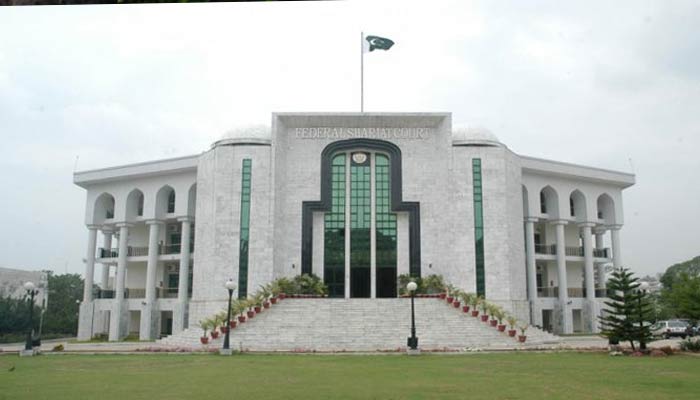Federal Shariat Court rules transgenders cannot decide their gender identity
Transgender people cannot identify as male or female based on self-proclaimed feelings or desires, rules shariat court
ISLAMABAD: The Federal Shariat Court on Friday ruled that transgender people were not allowed to identify as either male or female based "only on their self-proclaimed feelings or desires," and that the gender of a person would be based on their dominant physical features or secondary sex characters.
"Neither can transgenders identify themselves as male or female nor can they change their gender based only on their self-proclaimed feelings and desires," the court ruled on a petition challenging the Transgender Act.
The order was announced by the Acting Chief Justice of the Federal Shariat Court Dr Syed Muhammad Anwer and Justice Khadim Hussain Shaikh.
The court made it clear in its order that gender was related to a person's biological sex, and had a specific bearing on how various forms of worship, including daily prayers, fasting, Hajj, etc are performed in Islam.
“A person's gender cannot be determined by their feelings,” the ruling said, adding: "Shariah does not permit anyone to have their gender reassigned because of impotence as the gender remains the same as it was at birth".
“No one can be declared transgender based on physical features and self-made identity,” said the verdict and added that the gender of an individual would be determined by their dominant physical features or secondary sex characters.
The court stated that those exhibiting dominant male features would be considered male transgenders; whereas those with dominant female features would be considered female transgenders.
“If a man or a woman calls themselves transgender outside of their biological sex then it is against Shariah,” said the verdict.
The verdict stated that Sections 7 and 3 of the Transgender Protection Act were against Islam and Shariah. The court also struck down Section 2F of the Act.
The court also declared that the rules made under the Transgender Protection Act as “illegal”.
However, the court ruled that it was the responsibility of the government to ensure the rights of transgender persons as "Islam provides them will all human rights".
The act
The Transgender Persons (Protection of Rights) Act was passed by the Parliament in 2018. The law prohibits discrimination against transgender people in schools, workplaces and public spaces, and ensures their right to vote, inherit property and run for public office.
In 2022, politicians from religious political parties, including the Jamat-e-Islami and Jamiat Ulema-e-Islam Pakistan-Fazl, kicked up a row, insisting that the law is against Islamic tenets and should be immediately amended.
Social media users and conservative politicians accuse the law of permitting gender-reassignment surgeries, same-sex marriages, and cross-dressing. They also claim that since 2018, when the law was passed, over 23,000 people have changed their genders.
The claim that the law will allow men to change their gender to female and women to male on official documents is incorrect.
The law clearly defines a “transgender person” as one who is “intersex” with a mixture of male and female genital features or a eunuch assigned the male gender at birth but undergoes castration or a trans person whose gender identity differs from the sex they were assigned at birth.
The Rules of the Act further clarify that a transgender person will have to approach the National Database and Registration Authority (NADRA) for a change of name or gender on identity documents, as per their self-perceived identity. And NADRA will only alter their gender from Female to the category “X” or Male to the category “X”.
“X” symbolises the third sex in Pakistan, a classification specially created for the trans community on the orders of the Supreme Court in 2009.
The law or the rules do not allow men to change their gender to female or vice versa on their CNICs, passports or other travel documents.
Apart from this, the law also allows transgender persons to register to obtain a driver's licence and passport; prohibits harassment of transgender persons at home and in public places; stops people from discriminating against transgenders in educational institutions and workplaces, in trade and health services, when using public transport, and when buying, selling, or renting property.
The law also calls for the establishment of safe houses for transgender persons and the provision of medical and educational facilities and psychological counselling to them.
Moreover, it makes it mandatory for the government to set up separate rooms at jails for transgenders and according to the law, they are also entitled to inherit property among other things.
-
Security forces gun down 30 terrorists in multiple IBOs in KP: ISPR
-
MQM-P calls for new province in Sindh
-
US report validates Pakistan military edge over India: PM
-
Banned TTP poses serious threat to Pakistan security: UNSC panel
-
CM Afridi clarifies remarks on by-poll after ECP requests army deployment
-
Dubai sees 3.2m Pakistani passengers in 2025 as airport sets new milestone
-
Security forces kill 23 Indian proxy terrorists in KP's Kurram
-
Pakistan to construct island to boost oil exploration: report












